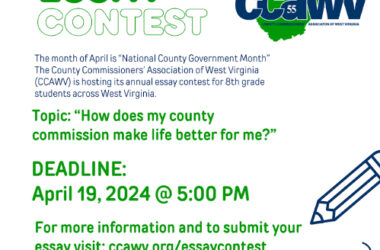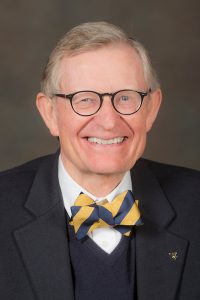Proposed changes expected to impact less than 5% of employees; Recommendations due by Sept. 15
By Don Smith, WV Press Association
MORGANTOWN, W.Va. — Faculty, staff and students filled the audience at the recent West Virginia University Board of Governors (BOG) meeting, waiting to hear updates on the announced academic transformation at WVU, an explanation of the program reviews, scheduling for the reduction in force, details of possible severance packages, and the future of WVU President Gordon Gee.
Some held handwritten posters calling for support of their classes, programs and positions. Others held signs questioning President Gee’s leadership and the current direction of the university, which faces both a $45 million budget deficit in 2024 and declining student enrollment projections.
As the members of the BOG returned from a lengthy executive session, they announced that President Gee’s contract with WVU would be extended into 2025, thereby charging him with leading the university through the academic transformation, handling the deficit, and making those tough decisions.
But for President Gee, the room was filled with something else: fear.
“My biggest … concern right now is that fact that there is a lot of fear,” Gee said, answering questions from the media after the BOG’s meeting.
“People have this notion that because we are examining half the programs that half the people are going to disappear,” Gee said of the ongoing academic program reviews at WVU, which are now focused on 48 percent of the university’s academic programs.
“Part of the narrative and part of the fear is (the thought that) if programs are under review … that means (the university) is going to do something. Fewer than five percent of those who are at this institution will be affected by this decision,” Gee said, adding, “but every one of those are individual lives, and we are concerned about our university family members.”
“September 15 is the date we will go to the board with the final recommendations,” Gee said of the transformation and related changes, which include RIF notices and severance plans.
“I believe speed is our friend. The faster you go through this process, (the faster) you squeeze fear out of the room,” Gee stated.
Both Gee and BOG Chair Taunja Willis-Miller, who joined Gee in answered questions from the media, said the changes are necessary.
Willis-Miller explained the $45 million deficit accelerated the process, but said, “The board started talking in 2020 about the need to review our programming and get prepared for the future.”
“If we didn’t have a budget deficit, I think this board would still say continue with the transformation,” Willis-Miller noted.
She said the board had started discussing how to reposition the university so it would be successful into the future, but then the pandemic and post-pandemic issues came. The impact of the pandemic issues, she said, certainly added to the issues created by the declining demographics already facing higher education.
Gee agreed that the deficit isn’t the only factor in the transformation, adding, in his opinion, the BOG would have said, “Go to work and re-imagine the university.”
“This is not a surprise. This is really the world in which we are living,” Gee said, adding that what is happening at WVU is happening at many universities and colleges throughout the nation.
WVU had a thousand students who did not return to the university after COVID, Gee said, noting WVU has lost 5,000 students from its peak enrollment. He said that after the pandemic millions of students did not return to higher education across the country.
Willis-Miller said the BOG and WVU administration were aware of and working on the issues.
“The higher education experts told us there was going to be a demographic cliff of college age students … and we knew those demographics were going to be exasperated in West Virginia. … We asked the administration to start doing that in 2020, and they started. And then we ended up having almost two years of ‘How are we going to have class today.’ … The pandemic really interrupted what we had thought would be a longer-range project,” she said.
“That’s what has gotten us to having an accelerated time frame (to resolve the issues). Plus, people want to know what is going to happen … The longer it drags out, the longer people are concerned and don’t know what is going to happen, so we want to get this transformation done,” she explained.
Gee said, “The difference for (WVU) is this: We made a decision we would not kick the ball down the road. A lot of institutions are trying to figure out how to kick.”
Gee said he has spoken recently with other university presidents about the “why are we doing it and how are we doing it” in terms of changes in higher education.
“I don’t mind being first in line as a university. We are very transparent. There is nothing we don’t tell our faculty, our staff, our students, and the state what we are doing,” Gee said.
“That comes with a danger. Because with that, you also get people wondering, ‘Is the university in crisis?’ We are not in crisis. … but when you do your laundry in public, you have that problem.”
Gee said the board and the administration decided to address the issue quickly.
“This board would not let us hang out with a $45 million budget deficit. They just said, ‘No.’ That was the catalyst. They gave us metrics we had to meet.”
The administration, Gee said, developed a plan to quickly meet those metrics.
WVU started a transformation process in 2015 with its “Freedom Agenda” to review programs,” Gee said, adding it wasn’t until 2020 that the BOG charged the administration with looking at all the academic programs in a data driven process.
“Not how we reduce them, but how we strengthen them and how we come up with the right formulas for the success of the university …,” he added.
Gee said the transformation is needed to help form WVU into a 21st century university, “so that we are very cognizant of what is needed for the people of the state, what is needed for the business and industry in the state, and what we need to do to keep our young people here.”
Willis-Miller said continuing the transformation was discussed during Gee’s review by the BOG.
“We need his continued leadership to get us through this initial thrust of the transformation, to get us to the other side. We ask a lot of things of him and his staff. They have been doing the things we ask of them with respect to academic transformation that we are focusing on now. We determined that we need to keep going on that path,” she said.
The extension approved Monday adds one more year to the contract, at no increase in Gee’s base salary.
In a prepared statement released by the university, Gee said, “I would like to express my gratitude to the Board of Governors for their faith in me and in the vision we share for this great University. I am grateful for the opportunity and look forward to continuing the important work we are doing. I love this University and the people of this state. And I will continue to work hard to reposition West Virginia University to be the national model for the modern land-grant university.”

In other action during the meeting, the Board approved several amendments following a public comment period to clarify parts of BOG Rules 3.9 and 4.7 which detail the Reduction in Force process, as well as a Faculty and Classified Staff Severance Package Schedule. However, the Board’s approval included a request to review clinical track and library track faculty inclusion.
The self study of programs identified for further review in early July as part of the Academic Program Portfolio Review is currently underway. Additional details are available at Academic Transformation website. And an in-depth timeline of the larger efforts, including FAQ and other resources, are available at transformation.wvu.edu.
The University’s Fiscal Year 2024 Financial Plan is also available, along with a report on Housing Public-Private Partnerships and a Debt Service and Debt Portfolio which details on public/private bonds and private debt, including details on interest, balance, original amount and lender.
The Board also set its committee assignments and other appointments. And this was the first meeting for new members Bob Reynolds, alumnus, longtime University supporter and namesake for Reynolds Hall, and Michael D’Annunzio, president of Beverage Distributors Inc. in Clarksburg. Also joining the BOG as the student representative is Student Government Association President Madison Santmyer. Staff Council Chair Shirley Robinson will serve as the classified staff representative, and Faculty Senate Chair Frankie Tack is the new faculty representative.
The next BOG meeting is scheduled for Aug. 22.






